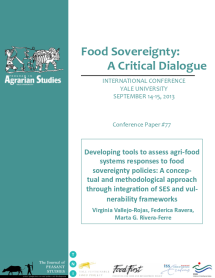For instance, policies for food security are specially linked to official frames, while food sovereignty requires of alternative frames. Within an alternative frame agri-food systems, commonly defined as a set of activities ranging from production through to consumption, can be conceptualized as integration and processes of interaction between humans and the agro-environment, i.e. complex social-ecological systems (hereafter SES).
Conceptualizing agri-food systems as SES and assessing their future vulnerability to global change and responses to food policies requires of new integrated frameworks. Here we propose to integrate the general conceptual and methodological SES framework proposed by Ostrom (2007; last revision in 2013) with the framework of vulnerability. Conceptually, the SES framework provides a common language and a logical linguistic structure for classifying those factors deemed to be important influences on the SES behaviour.
The vulnerability framework takes into account context-specific characteristics of sensitivity and capacity to adapt (at individual and collective level) generated and influenced by multiple factors and process, including the perception of actors about vulnerability for whom, at which scale and to what. Methodologically, the SES framework allows us identifying the boundary and components of SES, moving across spatial scales and institutional levels.
The framework analyzes how interactions may produce certain outcomes, such as impacts on food production and self-sufficiency, affected by internal feedbacks and external forces.
The integration between the system-oriented and the actor-oriented frameworks allows us analyzing the relationships between vulnerability, resilience and adaptive capacity as properties of the agri-food system, moving beyond the food security official focus.
The establishment of this link is important in the research of sustainable agri-food systems to socio-economic, political and environmental changes.
Virginia Vallejo-Rojas PhD candidate, by Polytechnic University of Catalonia As a PhD candidate, Virginia Vallejo Rojas is working on the development of new tools to assess agri-food system responses to policy changes. She is particularly focused in the social research linked to Ecuadorian Andean region. She holds an MSc in Biodiversity, Ecosystem Functioning and Management from the University of Basque Country, and completed her Bachelor in Biotechnology at Army Polytechnic School – ESPE in Ecuador.
Federica Ravera Post-doctoral researcher, Social-Ecological Systems Lab and Associate Researcher, Ethnoecology Lab Federica Ravera’s PhD in Environmental Science and Ecological Economics option (UAB) focused on vulnerability and local adaptation to climate change of semiarid socio-ecological systems. Her major research interests are related to the role of institutions in vulnerability/adaptation studies, gender and agro-biodiversity studies, participatory multicriteria assessment of ecosystems services in agriculture.
Marta G. Rivera-Ferre Associate Professor, University of Vic (Barcelona-Spain Marta G. Rivera-Ferre performs her research on food systems and sustainability from a wide scope, analysing interactions among different components of the systems. She has been interested in food sovereignty since 2006 and has centred the analysis of the proposal from a sociological perspective, including local research in Spain linked to the food sovereignty movement, and also from an international and institutional perspectives.
Food Sovereignty: a critical dialogue, 14 - 15 September, New Haven.

